Search result67 results
-
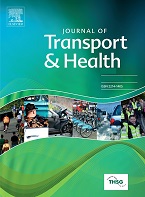
Who wants to change their transport habits to help reduce air pollution? A nationwide study in the caribbean
Francisco Alonso, Mireia Faus, Cristina Esteban, Sergio Useche
(2023). ArticleJournal of Transport & Health. No.33:101703
Given its detrimental role in sustainability and community health, air pollution constitutes a global challenge nowadays, and urban transport has been proven to be a key contributor to the problem. At a population level, and especially in Low- and Middle-Income Countries (LMICs), measures for reducing contamination usually require deep behavioral changes and “sacrifices” among individuals who may (or may not) be willing to modify their habits. Objective: This research, conducted in the Dominican Republic, aimed to assess the effect of individual factors, transport habits, and pollution-related concerns on the individual’s will to act to reduce air pollution. Methods: For this study, we...
Given its detrimental role in sustainability and community health, air pollution constitutes a global challenge nowadays, and urban transport has been proven to be a key contributor to the problem. At a population level, and especially in Low- and Middle-Income Countries (LMICs), measures for reducing contamination usually require deep behavioral changes and “sacrifices” among individuals who may (or may not) be willing to modify their habits. Objective: This research, conducted in the Dominican Republic, aimed to assess the effect of individual factors, transport habits, and pollution-related concerns on the individual’s will to act to reduce air pollution. Methods: For this study, we counted on the participation of a nationwide sample of 1250 adult Dominican citizens (50% females; 50% males) with a mean age of 36.7 years. Results: Overall, Dominicans tend to self-report a considerably high concern about transport air pollution, especially among women and inhabitants of urban areas. The willingness to act was significantly influenced by demographic factors, travel frequency, and pollution-related concerns. Also, both individual and socially perceived environmental concerns exert a statistical mediation between individual factors and the self-reported predisposition to help reduce pollution through behavioral changes. Conclusions: The results of this study suggest that both individual and social pollution-related concerns influence the personal willingness to act against air pollution, although in different ways. Interestingly, while peoples’ own concerns increase their willingness to act, solely perceiving a greater collective concern seems to dispirit individuals’ will to take further action. Accordingly, developing further individual and collective initiatives to increase pollution-related responsiveness could be essential to face this growing problem in the Dominican Republic and the Caribbean.
Read more Hide DOI: 10.1016/j.jth.2023.101703ISSN: 2214-1405 -

Different ways… same message? Road safety-targeted communication strategies in Spain throughout 61 years (1960-2021)
Mireia Faus, Cesáreo Fernández, Francisco Alonso, Sergio Useche
(2023). ArticleHeliyon. No.9(8)
Among the most generalised preventive measures against traffic crashes, advertisements and broadcast campaigns in the media have stood out over the last six decades. The core aim of this paper is to describe the evolution of the subject matter and typology of road safety-related advertisements used in Spain during 62 years (1960–2021). Thus, this paper assesses their role in reducing road fatalities, while keeping in mind the potential effect of the many other road safety-related preventive measures carried out in the country during this period. The results of this study allow us to target five key time periods, all of them with clear particular communication strategies to be...
Among the most generalised preventive measures against traffic crashes, advertisements and broadcast campaigns in the media have stood out over the last six decades. The core aim of this paper is to describe the evolution of the subject matter and typology of road safety-related advertisements used in Spain during 62 years (1960–2021). Thus, this paper assesses their role in reducing road fatalities, while keeping in mind the potential effect of the many other road safety-related preventive measures carried out in the country during this period. The results of this study allow us to target five key time periods, all of them with clear particular communication strategies to be differentiated, using specific types of advertisements and informative, persuasive, emotional, and humorous techniques (among others) to reach the audience. Additionally, some key practical implications and guidelines are provided.
Read more Hide DOI: 10.17583/ijep.8805ISSN: 2405-8440 -

3rd Ibero-American Congress Presevilab
Francisco Alonso
(2023). Participació en congressosDr. Francisco Alonso, Director of INTRAS, participated in Round Table 4 “Municipalities. Good practices applied to improve local accident rates”, in the 3rd Ibero-American Congress on Occupational Risk Prevention and Road Safety Presevilab held in Santa Cruz (Bolivia) on May 11-12, 2023. Organized by Fesvial (Spanish Foundation for Road Safety), the congress aims to generate an international forum in which governments, labor ministries, experts in road safety and occupational health, general traffic directorates, private companies, institutions, etc., can share their experiences and exchange knowledge, joining forces in the fight against all types of traffic accidents, including those...
Dr. Francisco Alonso, Director of INTRAS, participated in Round Table 4 “Municipalities. Good practices applied to improve local accident rates”, in the 3rd Ibero-American Congress on Occupational Risk Prevention and Road Safety Presevilab held in Santa Cruz (Bolivia) on May 11-12, 2023. Organized by Fesvial (Spanish Foundation for Road Safety), the congress aims to generate an international forum in which governments, labor ministries, experts in road safety and occupational health, general traffic directorates, private companies, institutions, etc., can share their experiences and exchange knowledge, joining forces in the fight against all types of traffic accidents, including those occurring in the workplace.
Read more Hide -
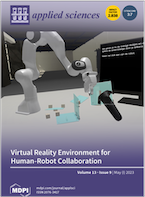
Effectiveness of driving simulators for drivers’ training: A systematic review
Francisco Alonso, Mireia Faus, José V. Riera, Marcos Fernandez-Marin, Sergio A. Useche
(2023). ArticleApplied Sciences. No.13(9):5266
Although driving simulators could be commonly assumed as very useful technological resources for both novel and experienced drivers’ instruction under risk control settings, the evidence addressing their actual effectiveness seems substantially limited. Therefore, this study aimed to analyze the existing original literature on driving simulators as a tool for driver training/instruction, considering study features, their quality, and the established degree of effectiveness of simulators for these purposes. Methods: This study covered a final number of 17 empirical studies, filtered and analyzed in the light of the PRISMA methodology for systematic reviews of the literature. Results: Among a...
Although driving simulators could be commonly assumed as very useful technological resources for both novel and experienced drivers’ instruction under risk control settings, the evidence addressing their actual effectiveness seems substantially limited. Therefore, this study aimed to analyze the existing original literature on driving simulators as a tool for driver training/instruction, considering study features, their quality, and the established degree of effectiveness of simulators for these purposes. Methods: This study covered a final number of 17 empirical studies, filtered and analyzed in the light of the PRISMA methodology for systematic reviews of the literature. Results: Among a considerably reduced set of original research studies assessing the effectiveness of driving simulators for training purposes, most sources assessing the issue provided reasonably good insights into their value for improving human-based road safety under risk control settings. On the other hand, there are common limitations which stand out, such as the use of very limited research samples, infrequent follow-up of the training outcomes, and reduced information about the limitations targeted during the simulator-based training processes. Conclusions: Despite the key shortcomings highlighted here, studies have commonly provided empirical support on the training value of simulators, as well as endorsed the need for further evaluations of their effectiveness. The data provided by the studies included in this systematic review and those to be carried out in the coming years might provide data of interest for the development and performance improvement of specific training programs using simulators for driver instruction.
Read more Hide DOI: 10.3390/app13095266ISSN: 2076-3417 -
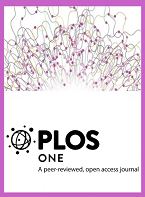
Far from reality, or somehow accurate? Social beliefs and perceptions about traffic crashes in the Dominican Republic
Francisco Alonso, Mireia Faus, Sergio Useche
(2023). ArticlePLoS ONE. No.14(18):e0282601
Background Despite the considerable effort made during the last decades, emerging countries are still among the highest road safety concerns because they still account for most of the deaths caused by traffic crashes. Various studies suggest that one of the factors involved in this negative outcome could be road safety. However, this issue remains pending to be addressed in most emerging countries, including the Dominican Republic. Aim This study aimed to assess the beliefs and perceptions of Dominicans regarding some key road risky-related issues and to discuss them in the light of objective data. Methods For this cross-sectional study, the responses by a full sample of 1,260...
Background Despite the considerable effort made during the last decades, emerging countries are still among the highest road safety concerns because they still account for most of the deaths caused by traffic crashes. Various studies suggest that one of the factors involved in this negative outcome could be road safety. However, this issue remains pending to be addressed in most emerging countries, including the Dominican Republic. Aim This study aimed to assess the beliefs and perceptions of Dominicans regarding some key road risky-related issues and to discuss them in the light of objective data. Methods For this cross-sectional study, the responses by a full sample of 1,260 Dominicans (50.1% men, 49.9% women) with a mean age of 39.4 years participating in a set of surveys conducted across the country, were used. Results Although Dominicans (especially women) seem to attribute high importance to road crashes, there is a low perceived likelihood of getting involved in a traffic crash. As for subjective versus objective data comparisons, perceived crash features and objective crash report data considerably match. However, the numbers largely differ in terms of crash frequency and importance and relevance given to road crashes, and their consequences. Further, perceptions of traffic violations and lack of law enforcement were pertinent predictors of the degree of relevance attributed to traffic crashes. Conclusions Overall, the results of this study suggest that, despite a relative awareness of their actual traffic crash features, Dominicans systematically underestimate the causes, frequency, and consequences of these crashes, including yearly fatality rates. These outcomes suggest the need to strengthen road safety awareness and beliefs in further road safety actions and policymaking in the region.
Read more Hide DOI: 10.1371/journal.pone.0282601ISSN: 1932-6203 -
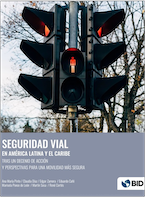
Experiences and lessons learned during the decade: Road safety management
Ana María Pinto, Claudia Díaz, Claudia Franchesca de los Santos, Christopher Persaud, Corina Puppo, Eduardo Café, Francisco Alonso, Hernán Paredes, Manuel Rodríguez, Marisela Ponce de León, Martín Sosa, Nathalie Chiavassa, Paula Cruz, Raphaël Dewez, Franco Azzato
(2023). LlibreThe first Decade of Action for Road Safety has ended, but not without demonstrating the importance that systemic work on road safety offers towards protecting life. At the same time, it is clear that real progress in road safety requires a significant commitment of time, resources and political effort. In the Latin American and Caribbean region (LAC), over the past ten years, the growth in the rate of vehicle deaths has slowed. Unfortunately, in the last two years this trend has reversed due to the expansion of the motorcycle fleet in the region. Although it has been possible to raise awareness, create institutions, plan and implement important actions to reduce fatalities, LAC has not...
The first Decade of Action for Road Safety has ended, but not without demonstrating the importance that systemic work on road safety offers towards protecting life. At the same time, it is clear that real progress in road safety requires a significant commitment of time, resources and political effort. In the Latin American and Caribbean region (LAC), over the past ten years, the growth in the rate of vehicle deaths has slowed. Unfortunately, in the last two years this trend has reversed due to the expansion of the motorcycle fleet in the region. Although it has been possible to raise awareness, create institutions, plan and implement important actions to reduce fatalities, LAC has not obtained the same results as high-income countries, which have entirely reversed the trend in road deaths. In accordance with the above, it is possible to conceive of a second decade of action as an opportunity for LAC countries to finalize the processes initiated over the past decade and to introduce successful lessons experiences from other countries in the region. With this study, the IDB intends to guide this process of continuous improvement, highlighting the best practices and offering an overview of how to move from theory to practice, following the principles that mobility must be safe, sustainable and inclusive, while reducing the risk to all road users, especially the most vulnerable, and maintain the focus on users with special needs (people with disabilities, children and the elderly).
Read more Hide DOI: 10.18235/0004843 -
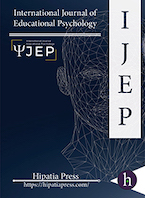
Are adult driver education programs effective? A Systematic Review of evaluations of accident prevention training courses
Mireia Faus, Francisco Alonso, Cristina Esteban, Sergio Useche
(2023). ArticleInternational Journal of Educational Psychology. No.12(1)
Road safety training programs are commonly used to raise awareness of risky attitudes and behaviors. The evaluation of road safety education courses aimed at children is carried out with some assiduity. However, this does not usually occur in courses aimed at young people and adults. The present systematic review aims to identify studies that evaluate the effectiveness of road safety training programs in this population group. This systematic review followed the PRISMA methodology, by which the relevant articles based on the research term were identified. A total number of 1,336 indexed articles were filtered, and a final selection of 22 articles directly addressing the issue was obtained....
Road safety training programs are commonly used to raise awareness of risky attitudes and behaviors. The evaluation of road safety education courses aimed at children is carried out with some assiduity. However, this does not usually occur in courses aimed at young people and adults. The present systematic review aims to identify studies that evaluate the effectiveness of road safety training programs in this population group. This systematic review followed the PRISMA methodology, by which the relevant articles based on the research term were identified. A total number of 1,336 indexed articles were filtered, and a final selection of 22 articles directly addressing the issue was obtained. Search strategies were developed and conducted in WOS, Scopus, NCBI, Google Scholar and APA databases. The selected articles indicate that the effects of road safety training programs in adults are mild to moderate. Their effectiveness is substantially increased when they are aimed at improving risk perception and decision making rather than training in driving skills. In any case, more evaluations of these courses are needed to identify which tools are effective and which should be replaced by new behavior modification methods in the design of future driver education programs.
Read more Hide DOI: 10.17583/ijep.8805ISSN: 2014-3591 -

Road Safety Seminar
Francisco Alonso
(2022). Participació en congressosDr. Francisco Alonso, Director of INTRAS, participated in the Seminar "MOBILITY SEAL: Mobility in the workplace. Operative and use of new technologies", held in Oviedo on 14 December 2022. Dr. Alonso presented the lecture entitled "Road Safety and Mobility in the workplace: Principles, foundations, methods and instruments". The seminar, organised by the Asturian Institute of Occupational Risk Prevention IAPRL, dealt with topics of interest to the organisations of the Asturian Safe Mobility in the Workplace Seal and which will have an impact on their management of occupational road safety, such as the growing focus on sustainability, the possibilities offered by new technologies on both...
Dr. Francisco Alonso, Director of INTRAS, participated in the Seminar "MOBILITY SEAL: Mobility in the workplace. Operative and use of new technologies", held in Oviedo on 14 December 2022. Dr. Alonso presented the lecture entitled "Road Safety and Mobility in the workplace: Principles, foundations, methods and instruments". The seminar, organised by the Asturian Institute of Occupational Risk Prevention IAPRL, dealt with topics of interest to the organisations of the Asturian Safe Mobility in the Workplace Seal and which will have an impact on their management of occupational road safety, such as the growing focus on sustainability, the possibilities offered by new technologies on both public and private roads, especially in the protection of the most vulnerable road users.
Read more Hide -

Kick-off event of the Aleatica Foundation for Road Safety
Francisco Alonso
(2022). Participació en congressosDr. Francisco Alonso, Director of INTRAS, participated at the kick-off event of the Aleatica Foundation for Road Safety, which was held in Mexico on 29 November 2022. As part of the event, a round table entitled "Awareness, Education and Technology: central axes to build a road safety culture" was organised, where Dr. Alonso presented the lecture "Road safety from an Ibero-American perspective". The day after, the first meeting of the Foundation's Advisory Committee, of which Dr. Alonso is a member, took place. Set up by the company Aleatica, the Aleatica Road Safety Foundation aims to promote road safety projects initially in Mexico, with a view to expanding to Latin America and, later,...
Dr. Francisco Alonso, Director of INTRAS, participated at the kick-off event of the Aleatica Foundation for Road Safety, which was held in Mexico on 29 November 2022. As part of the event, a round table entitled "Awareness, Education and Technology: central axes to build a road safety culture" was organised, where Dr. Alonso presented the lecture "Road safety from an Ibero-American perspective". The day after, the first meeting of the Foundation's Advisory Committee, of which Dr. Alonso is a member, took place. Set up by the company Aleatica, the Aleatica Road Safety Foundation aims to promote road safety projects initially in Mexico, with a view to expanding to Latin America and, later, to Europe. Some of the objectives of the Aleatica Foundation are: * To ensure that the right to road safety is a right for everyone * To move from commitment to action: Working hand in hand with the private sector, public sector and civil society, with an integrated approach. * The aim is to have safer infrastructure, users and vehicles.
Read more Hide -
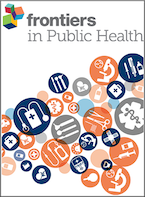
Are social networks effective in promoting healthy behaviors? A systematic review of evaluations of public health campaigns broadcast on Twitter
Mireia Faus, Francisco Alonso, Arash Javadinejad, Sergio Useche
(2022). ArticleFrontiers in Public Health. No.10:1045645
Introduction: While public health campaigns disseminated through Twitter have multiple theoretical advantages over other strategies (e.g., a high potential reach and low economic cost), the effectiveness of social networks as facilitators of attitudinal and behavioral changes in the population seems to remain weakly supported. Therefore, this systematic review was aimed to analyze the degree of impact of healthy behavior-related campaigns as documented in scientific literature. Methods: Strictly following the PRISMA methodology, a total of 109 indexed articles were obtained, of which only 18 articles met the inclusion criteria. In addition to accessing the literature available on WOS,...
Introduction: While public health campaigns disseminated through Twitter have multiple theoretical advantages over other strategies (e.g., a high potential reach and low economic cost), the effectiveness of social networks as facilitators of attitudinal and behavioral changes in the population seems to remain weakly supported. Therefore, this systematic review was aimed to analyze the degree of impact of healthy behavior-related campaigns as documented in scientific literature. Methods: Strictly following the PRISMA methodology, a total of 109 indexed articles were obtained, of which only 18 articles met the inclusion criteria. In addition to accessing the literature available on WOS, Scopus, BVS, Medline, Cochrane Library and PubMed, the quality of the existing studies was assessed through the Critical Appraisal Skills Programme (CASP) protocol. Results: The results of this systematic review revealed a small number of evaluations of the effectiveness of social campaigns disseminated on Twitter, although the quality of these studies was considerably good. Most of the research used statistics and metrics for evaluation, with residual use of other measurement methodologies. However, their effectiveness and impact on public health-related behaviors remain arguable, in view of the existence of marked tendencies to: (i) not evaluate these campaigns; (ii) evaluate them through excessively brief, ambiguous, or potentially biased indicators; and (iii) not carry out systematic follow-ups over time. Discussion: Although there is no strong evidence of the suitability of Twitter as a suitable medium for raising public health awareness on behavioral health affairs, the actual limitations identified in this review would help to optimize this paradigm and enhance the quality, reach, and effectiveness of such communication strategies.
Read more Hide DOI: 10.3389/fpubh.2022.1045645ISSN: 2296-2565









